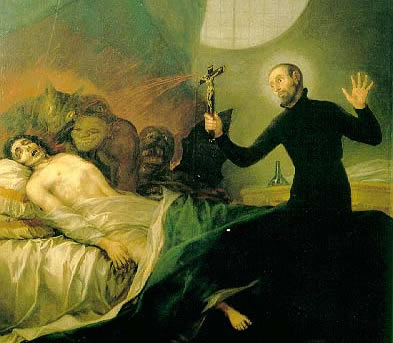It’s amazing how much of mainstream culture is now uncoupled from reality. Fake TV weddings, psychic readings, conspiracy theories and fake news are all the rage. Even the President is a fugazi, a Simon Cowell-ish strongman, a make-believe Manhattan builder, who holds the highest office in the land after pulling out of a role to play the same in Sharknado 3. It’s an illusion, yet it’s also real enough to get us all killed.
It was assumed after devotion to religion began to wane in the West during the second half of the 20th century that the world would become a more rational place. That hasn’t occurred. Most of us live adrift in a nebulous region inside our smartphones where we try to present the avatar we dream of being.
Even exorcisms, once scary as hell, have been commodified and packaged, staged for a fee by entrepreneurs of no particular denomination. Some consumers want them for reassurance, others for entertainment. With VR developing, won’t we soon be able to immerse ourselves in such a scenario at will, when we’re not visiting a simulated genocide or experiencing a virtual plane crash? It will all feel authentic, except that it will be free of consequences. Or so it will seem.
From the Economist:
THE exorcist, Philippe Moscato, walks from room to room in a large Paris flat, sprinkling blessed water and offering incantations. “Spirits away!”, he calls out, telling pests their attacks will, from now on, be futile. He informs the homeowner the air will improve after his work is done, with the entire apartment block likely to benefit. For the ritual, which lasts an hour, Mr Moscato pockets €155 ($182). He says he despooks property in Paris a few times each week and roughly once a week conducts an exorcism of a person. He is not alone. Look online and a host of private exorcists, healers, mediums, kabbalists, shamans and energiticians offer similar services, for fees as high as €500 per ceremony. Some offer to help a business out of a bad patch, or to restore love to a failing relationship. Many help with supposed hauntings of properties. One self-declared exorcist near Paris says he earns as much a €12,000 a month (before tax) by working 15-hour days, including consultations by phone. The exorcism business is on the rise in France. Why?
According to the exorcists they thrive because customers get much-needed benefits from the rituals. Mr Moscato, for example, describes an “avalanche” of demand following prominent terrorist attacks in France late in 2015. He suggests three parts of France are particularly vulnerable to “black magic”—Paris, Lyon and the French Riviera, where local mafia are said to be active—and this can be countered by sufficiently strong exorcists. Alessandra Nucci, a writer on Catholic matters who attended a course run by the International Association of Exorcists (IAE) in Rome, argues “absolutely, there are more and more” private operators in Europe who charge for their services. She says they fill a vacuum left by priests reluctant to do the job: the “church has, for too long, neglected exorcisms, despite strong demand from the public”, she says.•

